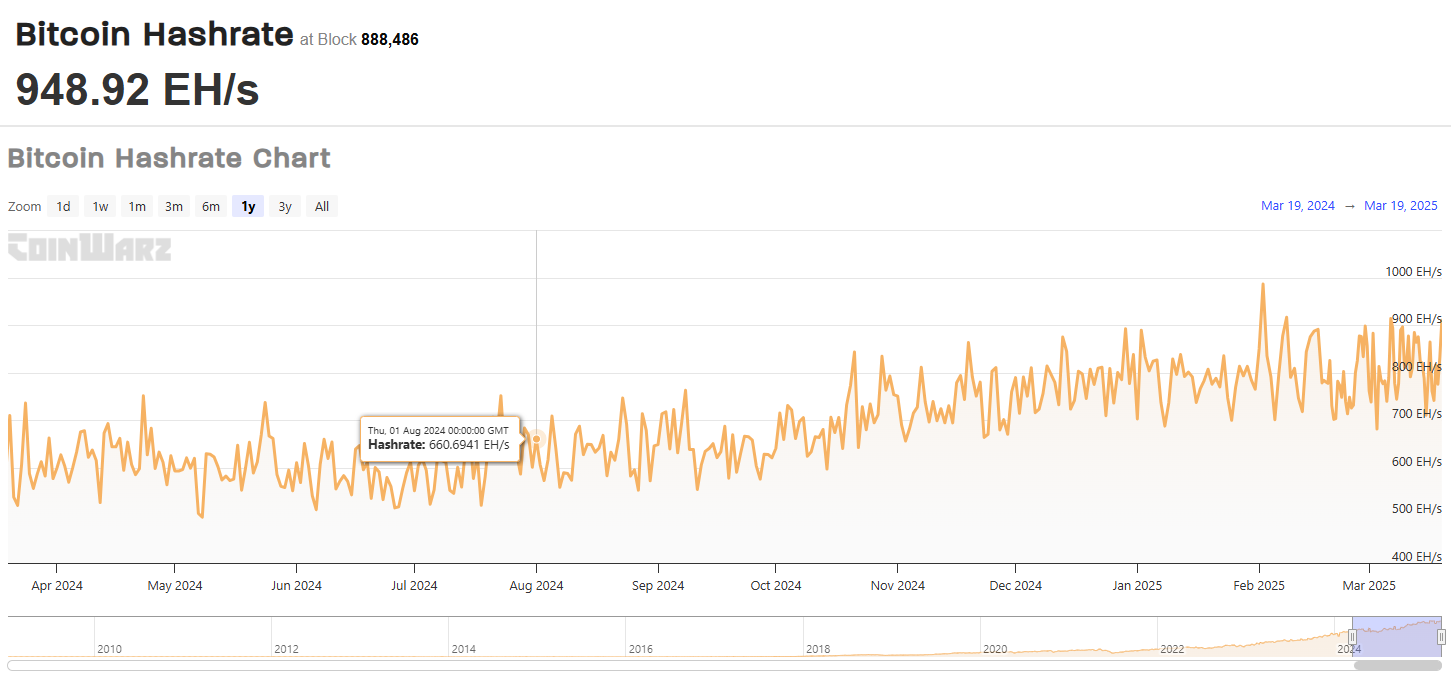Bitcoin, the pioneering cryptocurrency, operates on a decentralized network where transactions are verified through a process known as mining.
Central to this process is the concept of 'hashrate.' But what exactly is hashrate, and why is it so crucial to Bitcoin's functionality?
Understanding Bitcoin Hashrate
Hashrate refers to the computational power used to process transactions and secure the Bitcoin network. In simpler terms, it's the speed at which a miner's machine (or the entire network) completes an operation in Bitcoin's code.
This speed is measured in hashes per second (H/s). Given the vast number of calculations, we often use larger units:
| Hashrate Unit/s | Hash | Hashes Per Second |
|---|---|---|
| H/s (Hash) | 1 | One |
| kH/s (KiloHash) | 1,000 | One Thousand |
| MH/s (MegaHash) | 1,000,000 | One Million |
| GH/s (GigaHash) | 1,000,000,000 | One Billion |
| TH/s (TeraHash) | 1,000,000,000,000 | One Trillion |
| PH/s (PetaHash) | 1,000,000,000,000,000 | One Quadrillion |
| EH/s (ExaHash) | 1,000,000,000,000,000,000 | One Quintillion |
| ZH/s (ZettaHash) | 1,000,000,000,000,000,000,000 | One Sextillion |
| YH/s (YottaHash) | 1,000,000,000,000,000,000,000,000 | One Septillion |
A higher hashrate indicates more computational power, enhancing the network's security by making it more resistant to attacks. Conversely, a lower hashrate could make the network more vulnerable.
How to Calculate Bitcoin's Hashrate
Determining the exact hashrate of the Bitcoin network isn't straightforward due to its decentralized nature. However, we can estimate it using the network's current difficulty and block time:
Bitcoin adjusts its mining difficulty approximately every two weeks to ensure that blocks are added to the blockchain roughly every 10 minutes, regardless of the network's total computational power.
Hashrate Formula
The hashrate can be estimated using the formula:
The formula to estimate Bitcoin's network hashrate is:

Explanation
- Difficulty: The current mining difficulty of the Bitcoin network, which adjusts approximately every 2,016 blocks (~every two weeks).
- 232 or (4,294,967,296): A constant representing the total possible hash values.
- Average Block Time: The average time taken to mine a block, typically around 600 seconds (10 minutes).
Example Calculation
If Bitcoin's difficulty is 60 trillion (60 × 10¹²) and the average block time is 600 seconds, the estimated hashrate would be:

By inputting the current difficulty and average block time into the formula, we can estimate the network's hashrate. Several online calculators and platforms provide these real-time estimates for user convenience.
Current Bitcoin Hashrate
As of March 19, 2025, the Bitcoin network's estimated hashrate is approximately 948.92 EH/s.
This metric fluctuates based on factors like mining activity, technological advancements, and global economic conditions.
Monitoring platforms such as Blockchain.com and CoinWarz offer up-to-date charts and data on Bitcoin's hashrate.

Factors Affecting Bitcoin's Hashrate
Several elements influence the Bitcoin network's hashrate:
Mining Hardware: Advancements in mining equipment, such as Application-Specific Integrated Circuits (ASICs), can perform more hashes per second, increasing the overall hashrate.
Electricity Costs: Crypto mining is energy-intensive. Lower electricity costs can make mining more profitable, encouraging more miners to participate and boosting the hashrate.
Bitcoin's Market Price: A higher Bitcoin price can attract more miners seeking profitability, leading to an increased hashrate. Conversely, a declining price might deter miners, reducing the hashrate.
Regulatory Environment: Government policies and regulations can impact mining operations. Favorable regulations can encourage mining, while restrictive policies might hinder it.
How to Monitor Bitcoin's Hashrate
Keeping track of Bitcoin's hashrate is vital for understanding the network's health and security. Here's how you can monitor it:
Online Platforms: Websites like Blockchain.com and CoinWarz provide real-time data and charts on Bitcoin's hashrate.
Mining Pools: If you're part of a mining pool, they often offer dashboards displaying the current hashrate and other relevant metrics.
Blockchain Explorers: These tools allow users to explore real-time data on blocks, transactions, and network statistics, including hashrate.
Conclusion
Understanding Bitcoin's hashrate is crucial for anyone interested in the cryptocurrency space. It not only reflects the network's security and efficiency but also provides insights into the economic dynamics of mining.
By staying informed about hashrate trends and the factors influencing them, participants can make more educated decisions in the ever-evolving world of Bitcoin.
HODL Bitcoin with Ease on Komodo Wallet
Whether you're a miner securing the network or an investor building your Bitcoin holdings, Komodo Wallet (mobile) provides the tools you need.
Easily buy Bitcoin with fiat using the integrated on-ramp, then store, send, and receive BTC with a non-custodial solution that keeps you in full control.
Bitcoin Hashrate FAQ
How does Bitcoin's hashrate affect mining profitability?
A higher hashrate indicates more competition among miners, making it harder to solve blocks and earn rewards. This can decrease individual mining profitability unless offset by factors like lower electricity costs or more efficient hardware.
What factors can cause fluctuations in Bitcoin's hashrate?
Fluctuations can result from changes in mining hardware efficiency, electricity prices, Bitcoin's market value, and regulatory shifts affecting mining operations.
How can I monitor Bitcoin's hashrate trends effectively?
Utilize online platforms like Blockchain.com, CoinWarz, and various blockchain explorers to access real-time data and historical charts of Bitcoin's hashrate.
For Bitcoin miners aiming to scale their operations with optimized software and tools, consider exploring solutions offered by Komodo, a leader in blockchain technology and services.
